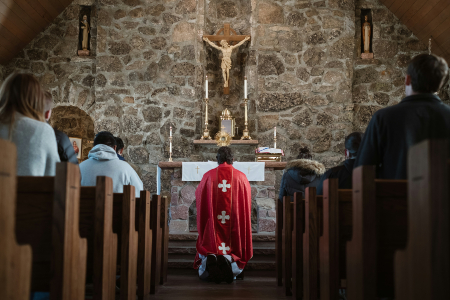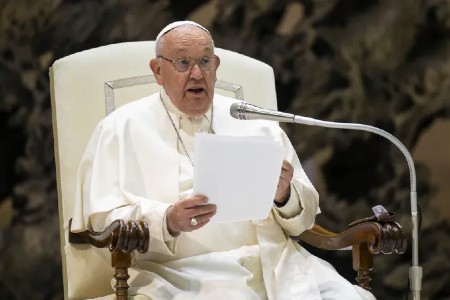We ask you, humbly: don't scroll away.
Hi readers, it seems you use Catholic Online a lot; that's great! It's a little awkward to ask, but we need your help. If you have already donated, we sincerely thank you. We're not salespeople, but we depend on donations averaging $14.76 and fewer than 1% of readers give. If you donate just $5.00, the price of your coffee, Catholic Online School could keep thriving. Thank you.Help Now >
Bl. Giuseppe Maria Tommasi
FREE Catholic Classes
A Cardinal, noted for his learning, humility, and zeal for reform; born at Licata, Sicily, of a princely family, 12 September, 1649; died in Rome, 1 January 1713. Though destined by his father for the Spanish Court, he joined the Clerks Regular of the Theatine Order at Palermo, 24 March, 1665, renouncing his primogeniture and the princedom in favour of his brother. He was professed 25 March, 1666. He studied philosophy, first at Messina, and later, owing to poor health, at Ferrara and Modena ; and theology in Rome and Palermo. He was ordained priest on Christmas Day, 1673. To a wide knowledge of Greek, he united the study of Ethiopic, Arabic, Syriac, Chaldaic and Hebrew--converting his master a Jewish rabbi, to Christianity. From the Psalters in these different languages, he collected the titles of the Psalms. He devoted himself to the study of Scripture and the Fathers. Searching the chief libraries, archives, and monuments, he retraced the ancient ecclesiastical discipline and liturgy.
His valuable works ( Codici Tommasiani ), published chiefly from ancient codices in the Vatican and Vallicellian Libraries and the Library of Christina of Sweden, were highly praised by the different academies of Europe, even Protestant. Chief among his publications are the "Codices sacramentorum nongentis annis antiquiores" (Rome, 1680), partly transcribed by Mabillon in his "Liturgia Gallicana". Following these, in order of time, were: "Psalterium" (Rouse, 1683), according to the Roman and Gallican editions, published under the name of Giuseppe Maria Caro". In this work Tommasi introduced Origen's symbols (obeli and asterisks ), obsolete for nine centuries. Under the same pen-name Tommasi wrote "Responsalia et Antiphonaria Rom. Eccl.", etc (Rome, 1686); "Sacrorum Bibliorum Tituli, sive capitula" (Rome, 1688); Antiqui libri Missarum Rom. Eccl." or the Antiphonary of Pope Saint Gregory , entitled "Comes", written by Alcuin at the order of Charlemagae (Rome, 1691); "Officium Domicinae Passionis", used by the Greeks on Good Friday, translated into Latin (Rome, 1695). Under his proper name he published "Speculum" (Rome, 1679); "Exercitium Fidei, Spei et Caritatis" (Rome, 1683); "Breviarium psalterii (Rome, 1683); "Vera norma di glorificar Dio" (Rome, 1687); "Fermentum" (Rome, 1688); "Psalterium cum canticis" (Rome, 1697); "Indiculus institutionum theologicarum veterurn Patrum" ( 3 vols., Rome, 1709, 1710; 1712), an exposition of theological theory and practice, derived from original patristic sources. Tommasi also wrote numerous opuscula , the last four published by G. Mercati (Rome, 1905). In 1753 Vezzosi published his works in eleven quarto volumes.
Tommasi's efforts at reform were directed not to the introduction of the new, but to the restoration and maintenance of the old. He was not always upheld and was sometimes rebuked for his zeal. Innocent XII made him examiner of the bishops, or of the clergy. Clement XI appointed him consultor of the Theatine Order, theologian of the "Congregatio super Disciplinâ Regulari" and other Congregations, consultor of the Congregations of Rites and Indulgences, and qualificator of the Holy Office. The same pope created him cardinal-priest of the Title of S. Martino ai Monti and compelled him to accept the honour. Taking St. Charles Borromeo for his model, Tommasi practised humility and charity towards the poor. He taught catechism to the children of the poor in his titular church. He introduced the use ot Gregorian chant in his church. On his death he was mourned by all, even by the pope, who so admired his sanctity that he consulted him before accepting the papacy. He was beatified by Pius VII, 5 June, 1803. Every year the Arcadians hold a religious and literary commemoration in his honour. His body rests in the church of S. Martino ai Monti.
We ask you, humbly: don't scroll away.
Hi readers, it seems you use Catholic Online a lot; that's great! It's a little awkward to ask, but we need your help. If you have already donated, we sincerely thank you. We're not salespeople, but we depend on donations averaging $14.76 and fewer than 1% of readers give. If you donate just $5.00, the price of your coffee, Catholic Online School could keep thriving. Thank you.Help Now >
Join the Movement
When you sign up below, you don't just join an email list - you're joining an entire movement for Free world class Catholic education.
-

-
Mysteries of the Rosary
-
St. Faustina Kowalska
-
Litany of the Blessed Virgin Mary
-
Saint of the Day for Wednesday, Oct 4th, 2023
-
Popular Saints
-
St. Francis of Assisi
-
Bible
-
Female / Women Saints
-
7 Morning Prayers you need to get your day started with God
-
Litany of the Blessed Virgin Mary
U.S. Catholic Parishes Experience Resurgence of Traditional Practices
-

Pope Francis Urges Faith and Prayers for Peace
-

Florida Welcomes Volunteer Chaplains to Public Schools
-
10 Fascinating Details About St. Joseph the Worker: Celebrating His Feast Day - May 1
-
St. Joseph the Worker: Model for Men, Young and Old
Daily Catholic
 Daily Readings for Thursday, May 02, 2024
Daily Readings for Thursday, May 02, 2024 St. Athanasius: Saint of the Day for Thursday, May 02, 2024
St. Athanasius: Saint of the Day for Thursday, May 02, 2024 The Our Father: Prayer of the Day for Thursday, May 02, 2024
The Our Father: Prayer of the Day for Thursday, May 02, 2024- Daily Readings for Wednesday, May 01, 2024
- St. Marculf: Saint of the Day for Wednesday, May 01, 2024
- To Saint Peregrine: Prayer of the Day for Wednesday, May 01, 2024
 Hi readers, it seems you use Catholic Online a lot; that's great! It's a little awkward to ask, but we need your help. If you have already donated, we sincerely thank you. We're not salespeople, but we depend on donations averaging $14.76 and fewer than 1% of readers give. If you donate just $5.00, the price of your coffee, Catholic Online School could keep thriving. Thank you. Help Now >
Hi readers, it seems you use Catholic Online a lot; that's great! It's a little awkward to ask, but we need your help. If you have already donated, we sincerely thank you. We're not salespeople, but we depend on donations averaging $14.76 and fewer than 1% of readers give. If you donate just $5.00, the price of your coffee, Catholic Online School could keep thriving. Thank you. Help Now >
![]()
Copyright 2024 Catholic Online. All materials contained on this site, whether written, audible or visual are the exclusive property of Catholic Online and are protected under U.S. and International copyright laws, © Copyright 2024 Catholic Online. Any unauthorized use, without prior written consent of Catholic Online is strictly forbidden and prohibited.
Catholic Online is a Project of Your Catholic Voice Foundation, a Not-for-Profit Corporation. Your Catholic Voice Foundation has been granted a recognition of tax exemption under Section 501(c)(3) of the Internal Revenue Code. Federal Tax Identification Number: 81-0596847. Your gift is tax-deductible as allowed by law.








 Daily Readings for Thursday, May 02, 2024
Daily Readings for Thursday, May 02, 2024 St. Athanasius: Saint of the Day for Thursday, May 02, 2024
St. Athanasius: Saint of the Day for Thursday, May 02, 2024 The Our Father: Prayer of the Day for Thursday, May 02, 2024
The Our Father: Prayer of the Day for Thursday, May 02, 2024
